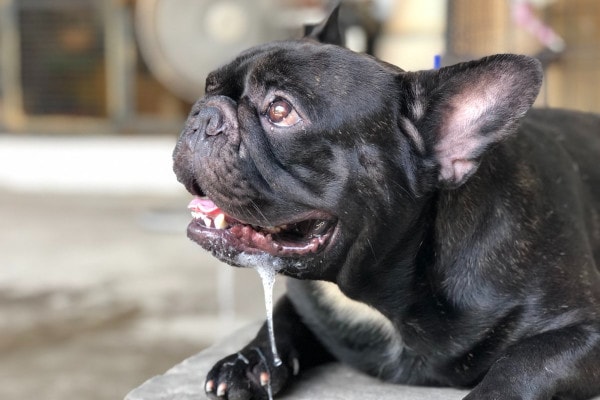Quick answer from Dr. Julie Buzby
- Peppermint essential oils or extracts—Exposure to small amounts of diluted peppermint oil may not be a problem for healthy dogs. But it can cause vomiting, diarrhea, skin irritation, respiratory problems, and ulcers in the mouth in the undiluted form or in high amounts.
- Peppermint candy—Eating peppermint candy can be potentially life-threatening for your dog if it contains chocolate or the sugar substitute xylitol. Plus, the wrappers may cause a GI obstruction. However, ingesting small amounts of peppermint candy that is free from chocolate or xylitol may only cause mild GI upset (or no symptoms).
- Peppermint plant—Chewing on or eating small amounts of the peppermint plant usually doesn’t cause issues for most dogs.

When you think of peppermint, you probably associate it with candy canes or flavored coffee drinks in the wintertime (peppermint mocha anyone?). Or perhaps you think about peppermint essential oil, mouthwash, or toothpaste. Whatever the connection, many humans enjoy and/or use peppermint products on a regular basis.
But what about your canine companion? Is peppermint essential oil safe for dogs? How much do you need to worry if your dog chews on a mint plant or eats some peppermint candy? These questions, and others, will be the focus of this article.
Let’s start at the beginning.
What is peppermint?
Peppermint is a type of perennial plant known as an aromatic herb. Its “minty” smell and taste comes from peppermint’s high menthol content.
Like other mint plants, peppermint usage has its origins in both foods and medicinal products. Fresh or dried peppermint leaves can be used in herbal teas and drinks. Plus, peppermint is responsible for the mint flavor in gum, toothpaste, candy, ice cream, and other consumables for humans. And topical products such as soaps, shampoos, and human skin care products may contain peppermint too.
In human medicine, peppermint oil may be used topically, diffused, instilled within the nose, or ingested in a capsule or tablet. It is reported to provide relief for muscle pain, nerve pain, itching, nausea, headaches, stress, and more. Plus, higher concentrations of peppermint oil can repel or possibly kill insects.

Can dogs have peppermint?
With all these potential uses in the human sector, it is only natural to wonder if dogs can have peppermint too. I’d like to be able to give you a clear “yes” or “no. Unfortunately, it isn’t so black and white. Peppermint oil or peppermint-containing items potentially can be toxic for dogs. But a little peppermint doesn’t automatically spell danger for all dogs.
In a pinch, remember this:
The degree of toxicity depends on the amount of peppermint and the presence of other harmful substances. High concentrations of peppermint oil are more likely to have negative consequences. And so are products that contain toxins like chocolate or xylitol in addition to peppermint.
Now let’s take a look at each of these forms of peppermint in more detail.
Is peppermint oil safe for dogs?
Peppermint oil contains highly concentrated aromatic compounds such as menthol. These compounds come from the stem and flowering parts of the peppermint plant. And they give peppermint its distinct smell.
Dogs who are exposed to small amounts of peppermint and diluted peppermint oil may not have any adverse reactions.
However, some dogs can be sensitive to the scent of peppermint products, especially peppermint candles and liquid potpourri. Dogs don’t seem to like the smell of peppermint as much as we do. And since peppermint oil has a strong scent, it can be irritating or unpleasant to them.
Plus, in its undiluted form or in high doses, peppermint oil can be toxic to dogs.
Symptoms of peppermint oil toxicity
Exposure to high concentrations of peppermint oil, peppermint extract (i.e. peppermint oil in a carrier such as alcohol), and liquid potpourri may cause serious symptoms such as:
- Vomiting and diarrhea
- Skin irritation when applied topically
- Being a severely lethargic dog
- Respiratory distress
- Seizures in dogs (when exposed to very high concentrations)
- Hypersalivation (causing the dog to keep licking his or her lips)
- Ulcers in the mouth if the dog licked the peppermint oil

Additionally, even in smaller amounts, peppermint oil may be contraindicated in dogs with liver disease in dogs. Essential oils contain high concentrations of terpenes, which are aromatic compounds that help give an item its fragrance. The liver is responsible for metabolizing terpenes. So a dog with a compromised liver may not be able to breakdown the terpenes in peppermint oil properly.
It is unknown exactly how much peppermint oil is toxic to dogs. Toxicity and lethal levels ultimately depend on how concentrated the product may be. Thus, when it comes to essential oils like peppermint, less may be safest. (Thankfully though, the risks of peppermint oil for dogs are less than for some other essential oils like pennyroyal, bitter almond, wormwood, or tea tree oil.)
What about peppermint oil for flea and tick control?
Currently, there are no studies to show that peppermint can provide health benefits for dogs. But there is anecdotal evidence that suggests peppermint essential oil may be effective when used for external parasite control. Therefore, some dog parents apply diluted peppermint oil or peppermint oil-containing products topically to their pups to provide natural flea and tick control.
However, keep in mind that peppermint oil can be absorbed through the skin. Thus, your dog may suffer the adverse effects discussed above when using a higher concentration product, especially if the dog licks it off.
I like to remind my clients that, just because something is natural, doesn’t necessarily mean it is safe (or effective). Personally, I’d still rather stick with the traditional veterinarian-prescribed flea and tick products which have undergone rigorous safety and efficacy trials.
Can dogs eat peppermint candy?
If your dog eats peppermint candy such a candy canes, peppermint bark, or peppermints, it might just cause an upset stomach. But it could also be life-threatening. Here’s why.
Risk of xylitol toxicity for dogs
Peppermint-based foods, especially sugar-free peppermint candy, may contain the sugar substitute xylitol. While xylitol is safe for humans, it can be deadly for dogs. Dogs with xylitol toxicity may have an extremely low blood sugar and/or suffer liver damage, both of which can be fatal.

Even a small amount of xylitol can be dangerous for dogs. Therefore, it is important to check the label on the candy (or other item) your dog ate very carefully for “xylitol” or “birch sugar” (another name for xylitol). And if the food contained xylitol, or if you aren’t sure, immediately call your vet or the ASPCA Animal Poison Control Center or Pet Poison Helpline for assistance.
Risk of chocolate toxicity for dogs
Another danger that some peppermint candies may pose is chocolate. Peppermint bark, chocolate-covered mints, or other chocolate and peppermint combinations can potentially cause chocolate toxicity in dogs. Ingesting a small amount of chocolate may only cause GI upset. But consuming larger amounts of chocolate, or the more concentrated forms of chocolate (e.g. cocoa powder or baker’s chocolate), may lead to tremors, heart arrhythmias, and even death in dogs.
Therefore, if your dog eats chocolate peppermint candy or peppermint bark, it is often best to check in with your vet or a pet poison control center.
Wrappers may cause a GI obstruction in dogs
Finally, the candy wrappers themselves can pose a problem. If the dog ate the peppermint candies wrappers and all, the wrappers can potentially block the GI tract. This may lead to vomiting, poor appetite, and the need for surgery.
Peppermint candy without chocolate or xylitol
All this being said, if your dog eats a small amount of peppermint candy that doesn’t contain xylitol or chocolate, and doesn’t eat the wrappers, he or she may be in the clear (or just in for some mild GI upset). The amount of peppermint in a few pieces of candy might not be enough to cause problems for many dogs. Same for peppermint ice cream or other peppermint foods.
However, it’s still a good idea to check in with your vet if you caught your dog eating peppermint candy, even if you don’t think it contained xylitol or chocolate.
Are peppermint plants safe for dogs?
Most dogs probably aren’t going to walk up to a peppermint plant and start munching on it, but some might. Thankfully, dogs who chew on or ingest a small portion of a mint plant should be ok. But when in doubt, please check in with a veterinarian or animal poison control center.
Can dogs have peppermint tea?
Anecdotal evidence suggests that peppermint may be safe if given to dogs in a tea form. There is no scientific research to prove that peppermint tea will provide health benefits. But there are some pet parents who feel that the tea helps soothe an upset stomach. And when applied topically, peppermint tea may have a cooling effect on a dog’s itchy skin.
What should I do if my dog eats peppermint?
When in doubt, it is best to call your veterinarian, ASPCA Animal Poison Control Center or the Pet Poison Helpline for advice. There is a fee associated with calling the poison control lines. But the advice (and peace of mind) they give is definitely worth it.

If your dog ate a few too many candy canes (or other candies), your vet or the poison control center may tell you to watch for signs of stomach upset. But if your dog ate peppermint candy that contained chocolate or xylitol, or may have consumed a lot of wrappers, they will advise you to make an emergency vet visit. The vet may may need to induce vomiting to help to prevent absorption of the xylitol or the toxins (e.g. theobromine) in the chocolate.
However, if a dog eats peppermint oil, it is not a good idea to induce vomiting. Instead, toxicology experts recommend diluting it with water or milk. The reason for this is that if a dog vomits peppermint oil and breathes in some of the vomit, the resulting aspiration pneumonia can be deadly.
For dogs who get too much peppermint oil (or any amount of undiluted peppermint oil) on their skin, toxicity experts typically recommend bathing your dog with a mild dishwashing soap. (This is the soap you use to wash dishes by hand, not what you put in the dishwasher.)
Then, after removing or neutralizing as much peppermint (or chocolate or xylitol) from the dog’s body as possible, the vet will make a treatment plan. Some dogs may need hospitalization and/or additional treatments to manage their symptoms.
Paws off the peppermint!
With the potential dangers that peppermint oil and peppermint candy can pose for pups, prevention is the best medicine. If, like many people, you enjoy peppermint candy, please keep it out of paws reach. And if you have undiluted peppermint oil or liquid potpourri in your house, ensure your dog can’t accidently lick it, ingest it, or otherwise come in contact with it.
Even with precautions, I know accidents can happen, though. So if your dog does get into the peppermint oil or candy, immediately reach out to your vet or a pet poison control center for help. Knowing what to do and taking quick action is the best way you can help your dog.
Has your dog ever gotten into peppermint candy?
Please comment below.


i used peppermint oil as a flea killer on my dog for years. will kill any bugs instantly. I figured it might not be healthy
Hi Neil,
I am glad you found the article to be informative and helpful. Hoping you can decide on a safer alternative for flea prevention in the future. Thanks for sharing!